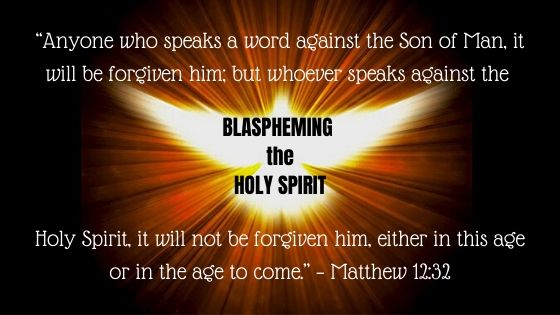When asked what is the unpardonable sin, some Christians might think it is suicide; it’s not. As tragic as it is, a person who commits suicide does not mean he or she automatically goes to hell.
However, the Scripture teaches that there is an unpardonable sin that will keep people out of heaven – blasphemy against the Holy Spirit. What does it mean to blaspheme the Holy Spirit?
Let us look at what the Bible says about the unforgivable sin of blaspheming the Holy Spirit and understand exactly what it is so that we will not commit it.
The Unpardonable Sin in Jesus’ Day
In a confrontation with the religious leaders during His ministry, the Lord Jesus spoke of an unforgivable sin called the “blasphemy against the Holy Spirit.” He said that whoever commits this terrible sin would never be forgiven. Indeed, they could not be forgiven in this life or the next.

What Does it Mean to Blaspheme?
The Greek word blaspheme is translated as “slander.” It has the idea to “speak against, insult, or a curse.” In Scripture, the word is used for insults hurled at both God and humans.
For example, the Greek noun blaspheme is used for people slandering one another. The apostle Paul used it in his letter to the Ephesians when he encouraged the believers not to “slander” others (Ephesians 4:31 NIV). In this context, it speaks of insults or curses one person directs at another.
The word translated blasphemy can also be used for strong insults or curses directed against God. Scripture records several examples of people cursing the God of the Bible.
The Israelites who came out of Egypt were accused of insulting or blaspheming God, for not only did they build a golden calf; they also claimed that this image was the actual god who brought them out of the land of Egypt (Nehemiah 9:18).
These acts by the people were considered insults or blasphemies against God. We find that Jesus Himself was accused of blasphemy by the religious leaders because He claimed the right or ability to forgive sins (Mark 2:7). They realized that God alone can forgive sins so they assumed Jesus was blaspheming by claiming the same authority.
Cursing God: A Serious Offense
We read in the Old Testament that cursing God was an extremely serious offense. Those who openly defied the Lord were to be cut off from the people, whether native-born Israelites or foreigners (Numbers 15:30-31). In Leviticus 24:15-16, we read that those who cursed the Lord were worthy of the death penalty.
Therefore, simply stated, the blasphemy against the Holy Spirit would involve some type of insulting or cursing the work of the Holy Spirit, and the Jewish audience which Jesus addressed certainly knew the serious nature of such a sin.
The background of Jesus’ statement about the unforgivable sin of blasphemy against the Holy Spirit can be found in Matthew 12:22-30.
Jesus healed a man who was possessed by a demon, His demon possession made him blind, mute, and probably deaf. This combination of illnesses made it impossible for anyone to cast the demon out of the man because there was no way anyone could communicate with him.
When the people saw Jesus heal the man they wondered if he could be the long-awaited Messiah. Indeed, who else but the Messiah could perform such a miracle? However, not everyone was convinced.
The Jews Accused Jesus of Blasphemy
The suggestion that Jesus could be the promised Messiah brought a quick response from the religious leaders:
But when the Pharisees heard this, they said, “It is only by Beelzebul, the prince of demons, that this fellow drives out demons” (Matthew 12:24).
They accused Jesus of casting out demons by the power of Satan. In other words, they could not deny His power but rather they attributed it to some evil or demonic source. Who would want to follow someone who is working with Satan?
Since the religious leaders were supposedly in a position to determine the source of Jesus’ miracles, this accusation had to be answered by the Lord.
Jesus’ Response: Satan does not Work against Himself
How did Jesus respond? By showing them how illogical their arguments were. He made it clear that Satan would not cast out Satan. We read this in Matthew 12:25-29. Satan was not in the business of casting out himself. The power to exorcise demons belongs to God and Him alone.
The fact that Jesus could cast out demons made it plain that the power of God was operating among them. Therefore, these people were held responsible to respond to God’s miraculous power in their midst.
To reject God’s work among them was insulting or cursing God. It was blaspheming the work of the Holy Spirit. As mentioned earlier, the Old Testament prescribed the death penalty for those who did such things.
Consequently, attributing Jesus’ Spirit-led miracles to a demonic source was the worst sin that they could commit. Indeed, by doing so, they were cursing the God of the Bible.
Jesus’ Response to those who Commit such a Sin
Matthew, Mark, and Luke record Jesus’ words about the fate of those who blaspheme against God the Holy Spirit.
In Matthew 12:31-32 and Luke 12:10-11, Jesus was recorded saying no forgiveness is possible for those who commit this sin while Mark quotes Jesus calling this eternal sin (Mark 3:28-30).
Nature of the Sin of Blasphemy against the Holy Spirit
From the above-mentioned sources, we can make some important key points from Jesus’ statements about the nature of the sin of blasphemy against the Holy Spirit.
The Sin was Unforgivable
First, this sin of blasphemy against the Holy Spirit is unforgivable.
When the religious leaders attributed the miracles that Jesus performed to demonic forces, Jesus made it plain to them the seriousness of their sin by telling them that there would be no forgiveness in this life and in the next for what they had done.
Indeed, this sin would keep the offenders out of heaven. In Mark’s gospel, we read Jesus calling this sin an “eternal sin.” In other words, it has everlasting consequences. Anyone who engages in such insults to God will not be forgiven whether in this life or in the next to come.
It is a Public Rejection of Jesus and His Message
We discover something else from Luke.
It also seems to consist of some public rejection of the ministry of Jesus as well as that of His disciples. In His next statement, after speaking of the blasphemy of the Holy Spirit, Jesus says that the Spirit will be with His disciples as they testify about Him before the religious authorities (Luke 12:11-12).
It is, therefore, seemingly more than a lack of belief in Christ. It is also the public denial of the testimony of the Holy Spirit that Jesus is the Messiah, the Christ.
Sins done in Ignorance against Jesus can be Forgiven
Interestingly, Jesus said that sins against Him could be forgiven but there would be no forgiveness of those who blaspheme the Holy Spirit. This seems to mean that people could ignorantly or unintentionally say things against Jesus without committing the unpardonable sin. Forgiveness is still possible for those who do this.
However, if a person knowingly and defiantly speaks insults against the power of the Holy Spirit, who is testifying to the truth of Jesus and His message, there is no forgiveness possible. This was an especially terrible sin that the religious leaders were committing.

They were publicly attributing Jesus’ miraculous power to the devil. It was not done in ignorance. In fact, it was a willing rejection of the God of the Bible, the God whom they were supposed to be serving.
Furthermore, they were doing it publicly, in front of the multitude. By doing so, they were pitting their authority against His.
It was an Insult to God
Especially in this particular context, the blasphemy against the Holy Spirit was a denial of the work of the Holy Spirit in the Person of Jesus Christ. The Holy Spirit was working in Jesus as well as through Jesus. The Spirit of God was testifying to everyone that Jesus was the Messiah.
Rejecting the message of the Spirit was the same as rejecting or insulting the God of the Bible.
It was a Continual State of Sin
Something else worth noting is that these religious leaders were in a continuous state of sin by denying that the miracles of Jesus were accomplished through the power of God. Thus, they were in a constant state of sin or rebellion against God.
What made matters worse was that these men were the religious authorities, the spiritual leaders. Their testimony carried great weight with the people. Their false accusations could not go unchallenged.
In fact, this continual rejection of the work of the Holy Spirit is the one sin that would keep them out of heaven. All other sins could and would be forgiven.
This was what Jesus meant when He spoke of the blasphemy against the Holy Spirit. These religious leaders were committing the unforgivable sin. No forgiveness was possible as long as they were doing this
Related Article: Understanding the Personality of the Holy Spirit
Conclusion
The blasphemy against the Holy Spirit is the public attributing of the work of the Holy Spirit, through Jesus Christ to Satan. The Holy Spirit testified of Jesus’ identity as the promised Messiah. Refusal to acknowledge this obvious testimony of the work of God was blaspheming the Holy Spirit.
The blasphemy against the Holy Spirit was more than one particular sin which the religious leaders of Jesus’ day were committing. It is a continuous state of publicly insulting or cursing the work of the Holy Spirit which was done in the Person of Christ.
Since there could be no real question that the miracles of Jesus had been brought about through the power of the Holy Spirit, anyone who would consciously and publicly reject this fact and attributes His work to Satan or some demonic force could not expect to be forgiven in this life or eternity
Blaspheming the Holy Spirit meant eternal damnation. Consequently, this is the one sin that would keep people out of heaven.
*Excerpt is taken from “Living in the Light of Eternity” (The After Life Series Volume 1) by Don Stewart.

